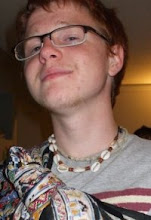This is the first trully interesting chapter of the book. It really begins with Dawkin's definition of a gene as a portion of chromosonal material that last long enough to become a unit of natural selection. It is Dawkins theory that the DNA's purpose is simply to exist and that from the first days of the primordial soup it has built more and more complex survival machines which is now all forms of life. For one who's familiar with evolution, this is kind of obvious and yet he states it in a way I've never thought of before. I've taken human biology and anatomy and physiology so I am familiar with the details of how DNA is the blueprint for the human body so much of what he's explaining I'm already familiar with. Before reading this chapter my personal definition of evolution would have been more along the lines of, "The process by which an organism becomes more suited to survival in its environment through mutation and natural selection." While I guess this is accurate, it is kind of limiting. Dawkin's definition of evolution as "The process by which a gene becomes more or less frequent in the gene pool" is much more functional. When looking at the organism as the unit of natural selection many behaviors simply don't make sense, such as charity or self sacrifice. However if you can change the question you're asking when observing behavior too, "How does this effect the amount of this gene in the gene pool?" The answers can become a lot more clearer. It is amazing how slightly retooling a definition it can make it much more powerful.
I've never believed that organisms did what was best for the group or the species. I hear this theory from a lot of people that don't know very much about evolution or biology. I usually try and explain to them that the individual does whats best for the individual and this simply happens to benefit the species (in most cases). They usually retort with that the organism is doing it specifically too better the species. I think humans have a habit of anthropomorphizing everything and a problem with trying to assign motivation or meaning where there may be none. But I realize now that I have been mistaking in placing the opus on the organism when trully it is the gene that is the functional unit of natural selection.
I think some people would be bothered by this theory, that they are a machine crafted by genes to serve their own purpose - slaves to their gene masters. They might deny the idea right out because it offends their sense of free will, individuality, I'm not sure how to put it. I think these may be people who don't know much about biology because for anyone who studies the human body its trully impossible to question the fact that the DNA creates us, gives us structure, gives us function, and gives us purpose. I think where Dawkin's trully diverges from theists is that he sees DNA as originating as replicating molecules (this theory has yet to be proven and I'm very skeptical though I'll accept it as a given for the purpose of this book) that slowly become more and more complex as survival becomes increasingly more challenging. Theists believe that DNA is coded by God. I find that hard to believe but I think no matter where you think DNA comes from or how it was formed (or evolved) you'd be hard pressed to try and argue that it doesn't dictate everything about the creation, function, and purpose of an organism. Also, on a side not, for the sake of Dawkin's theory it doesn't matter where you think DNA comes from. Whether formed by accident or the hand of God, genes are still competing to be sent on into the next generation, and the next, and the next, spiraling into infinity or extinction.
In a way Dawkin's is trying to be the Jared Diamond of human nature and explain how such a complex structure (for Diamond society and for Dawkin's the human animal) is built upon and entirely reliant upon all the tiny bricks that make it up and that understanding the structure is impossible without understanding it from the foundation up.

I enjoyed your insight
ReplyDelete